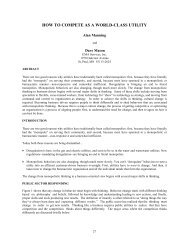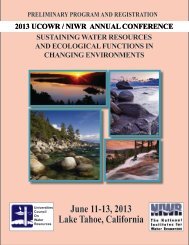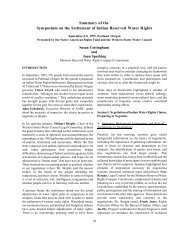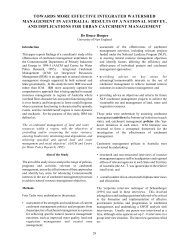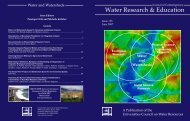62Genskow <strong>and</strong> Bornthe first Dungeness River Management Team,partnerships, planning, <strong>and</strong> implementation effortsin the Dungeness are a model <strong>of</strong> coordination <strong>and</strong>have led to significant accomplishments. Withoutknowledge <strong>of</strong> the intensive partnership efforts thatset it in motion, the Tomorrow-Waupaca projectcould appear to be a st<strong>and</strong>ard agency-drivenmanagement project. The transition in the Yakimafrom a model collaborative initiative to a planningeffort conducted in an environment <strong>of</strong> mistrustwith a reduced set <strong>of</strong> participants, sheds light onthe final plan recommendations <strong>and</strong> challenges <strong>of</strong>implementation.Conclusions <strong>and</strong> Implications for <strong>Research</strong>Collaborative <strong>and</strong> partnership-based watershedinitiatives for addressing complex water resourceissues are now commonplace. These efforts are<strong>of</strong>ten perceived as single coordinating basin-wideorganizations, but we have suggested a broaderview <strong>of</strong> the organizational space in which watershedinitiatives take place. This exp<strong>and</strong>ed view recognizesthe ebb <strong>and</strong> flow <strong>of</strong> partnership initiatives <strong>and</strong> looksbeyond individual coordinating bodies to incorporatekey individuals, previous partnership incarnations,<strong>and</strong> the social capital developed or diminishedby related <strong>and</strong> previous efforts. Effectivelyaddressing complex environmental managementissues through integrated approaches requiresunderst<strong>and</strong>ing the contextual dynamics shapingthe complex organizational field or “institutionalecosystem” in watersheds. In sum, partnershipsthat form around watersheds are fluid <strong>and</strong> <strong>of</strong>tenephemeral, which has implications for howagencies, funding organizations, <strong>and</strong> local partnersengage, evaluate, <strong>and</strong> provide resources for theefforts. We recognize the challenge <strong>of</strong> maintaininga long-term perspective in place <strong>and</strong> activitiesin an environment <strong>of</strong> close scrutiny, governmentaccountability, short-term time expectations, <strong>and</strong>outcome-focused evaluations.It is clear that more research is needed regardingthe efficacy <strong>of</strong> this approach, assessing integratedinitiatives, <strong>and</strong> the influences <strong>of</strong> their many derivativepieces. Studies involving large sample sizes <strong>and</strong>static cross-sectional cases have been undertaken,<strong>and</strong> while important for helping underst<strong>and</strong> theeffectiveness <strong>of</strong> integrated approaches, focus onpoints in time <strong>and</strong> <strong>of</strong>ten overlook critical long-termrelationships <strong>and</strong> cycles. The difficulty <strong>of</strong> adequateevaluation absent these factors demonstratesa need for combining methods for careful <strong>and</strong>comparative longitudinal case-study research withstatistical analyses <strong>of</strong> multiple watershed initiativesto accommodate organizational change <strong>and</strong> itspotential influence on management outcomes.Such studies will be challenging <strong>and</strong> would benefitfrom coordination <strong>and</strong> shared approaches amongmultiple researchers.Finally, partnership approaches <strong>and</strong> integratedinitiatives are applied across the hydrologicalspectrum from very large river basins to smallwatershed systems. Dynamic organizational arrangements<strong>and</strong> variations in institutional ecosystemsare relevant across that spectrum, reinforcingthe importance <strong>of</strong> situational <strong>and</strong> place-basedassessments. It is important for resource managers<strong>and</strong> funding organizations to recognize thatformulaic assessments <strong>of</strong> “success” <strong>and</strong> inflexibleprescriptive approaches to develop collaborationmay serve most effectively as general “guidance”but have limited use for successfully undertakingintegrated management efforts in watersheds.Author Bios <strong>and</strong> Contact InformationKENNETH D. GENSKOW is an Assistant Pr<strong>of</strong>essor inthe Department <strong>of</strong> Urban <strong>and</strong> Regional Planning atthe University <strong>of</strong> Wisconsin-Madison. Dr. Genskowserves as a water resources specialist with University<strong>of</strong> Wisconsin-Cooperative Extension <strong>and</strong> is affiliatedwith the University <strong>of</strong> Wisconsin’s EnvironmentalResources Center <strong>and</strong> the Gaylord Nelson Institutefor Environmental Studies. His research <strong>and</strong> outreachactivities emphasize watershed management, waterresource planning <strong>and</strong> policy, <strong>and</strong> collaborative <strong>and</strong>participatory approaches to resource management. Hecan be contacted at kgenskow@wisc.edu or Departmentt<strong>of</strong> Urban <strong>and</strong> Regional Planning, 925 Bascom Mall,Madison, WI 53706.STEPHEN M. BORN is Pr<strong>of</strong>essor Emeritus in theDepartment <strong>of</strong> Urban <strong>and</strong> Regional Planning <strong>and</strong> theGaylord Nelson Institute for Environmental Studies atthe University <strong>of</strong> Wisconsin-Madison. Dr. Born focuseshis research, pr<strong>of</strong>essional <strong>and</strong> outreach activities onwater <strong>and</strong> related resource planning <strong>and</strong> managementissues, <strong>and</strong> the theory <strong>and</strong> application <strong>of</strong> integratedenvironmental management concepts. As a formerWisconsin State Planning Director, he is also involvedwith state, regional <strong>and</strong> intergovernmental policy <strong>and</strong>planning issues.UCOWRJOURNAL OF CONTEMPORARY WATER RESEARCH & EDUCATION
Organizational Dynamics <strong>of</strong> <strong>Water</strong>shed Partnerships63ReferencesAlex<strong>and</strong>er, E. 1993. Interorganizational coordination:Theory <strong>and</strong> practice. <strong>Journal</strong> <strong>of</strong> Planning Literature7(4): 328-343.Amy, D.J. 1997. The Politics <strong>of</strong> EnvironmentalMediation. New York: Columbia University Press.Bellamy, J. A., G. T. McDonald, G. J. Syme, <strong>and</strong> J. E.Butterworth. 1999. Evaluating integrated resourcemanagement. Society <strong>and</strong> Natural Resources 12:337-353.Born, S. M. <strong>and</strong> K. D. Genskow. 1999. Exploring the<strong>Water</strong>shed Approach: Critical Dimensions <strong>of</strong> State-Local Partnerships. River Network.Born, S. M. <strong>and</strong> K. D. Genskow. 2000. The watershedapproach: An empirical assessment <strong>of</strong> innovation inenvironmental management. In National Academy<strong>of</strong> Public Administration. 2000. Environment gov:Transforming environmental protection for the 21stCentury. <strong>Research</strong> Papers 7-10, Volume II.Born, S.M. <strong>and</strong> K.D. Genskow. 2001. TowardUnderst<strong>and</strong>ing New <strong>Water</strong>shed Initiatives: A ReportFrom the Madison <strong>Water</strong>shed Workshop. University<strong>of</strong> Wisconsin-Cooperative Extension.Born, S. M. <strong>and</strong> W. Sonzogni. 1995. Integratedenvironmental management: Strengthening theconceptualization. Environmental Management 19:167-181.Chess, C. <strong>and</strong> G. Gibson. 2001. <strong>Water</strong>sheds are notequal: Exploring the feasibility <strong>of</strong> watershedmanagement. <strong>Journal</strong> <strong>of</strong> the American <strong>Water</strong>Resources Association. 37(4):775–782.Conley, A. <strong>and</strong> M. A. Moote. 2003. Evaluatingcollaborative natural resource management. Society<strong>and</strong> Natural Resources 16: 371-386.Coughlin, C. W., M. L. Hoben, D. W. Manskopf, S. W.Quesada, <strong>and</strong> J. Wondolleck. 1999. A SystematicAssessment <strong>of</strong> Collaborative Resource ManagementPartnerships. University <strong>of</strong> Michigan School <strong>of</strong>Natural Resources <strong>and</strong> Environment.Genskow, K. D. 2001. Critical Factors for<strong>Water</strong>shed Partnerships: An Analysis <strong>of</strong> Actions<strong>and</strong> Accomplishments. Dissertation. University <strong>of</strong>Wisconsin-Madison.Getches, D. H. 1998. Some irreverent questions aboutwatershed-based efforts. In Brick, P., D. Snow, <strong>and</strong>S. Van De Wetering, (Eds.) 2001. Across the GreatDivide: Explorations in Collaborative Conservation<strong>and</strong> the American West. Isl<strong>and</strong> Press: Washington,DC.Godschalk, D. 1992. Negotiating intergovernmentaldevelopment policy conflicts: Practice-basedguidelines. <strong>Journal</strong> <strong>of</strong> the American PlanningAssociation 58(3): 368-378.Griffin, C. B. 1999. <strong>Water</strong>shed councils: An emergingform <strong>of</strong> public participation in natural resourcemanagement. <strong>Journal</strong> <strong>of</strong> the American <strong>Water</strong>Resources Association 35(3): 505-518.Hooper, B. P., G. T. McDonald, <strong>and</strong> B. Mitchell, 1999.Facilitating integrated resource <strong>and</strong> environmentalmanagement: Australian <strong>and</strong> Canadian perspectives.<strong>Journal</strong> <strong>of</strong> Environmental Planning <strong>and</strong> Management42(5): 747-766.Huntington, C. W. <strong>and</strong> S. Sommarstrom. 2000. AnEvaluation <strong>of</strong> Selected <strong>Water</strong>shed Councils in thePacifi c Northwest <strong>and</strong> Northern California. Reportfor Trout Unlimited <strong>and</strong> Pacific Rivers Council.Hutchinson, J. <strong>and</strong> A. C. Vidal (Eds.). 2004. Usingsocial capital to help integrate planning theory,research, <strong>and</strong> practice. <strong>Journal</strong> <strong>of</strong> the AmericanPlanning Association 70(2): 142-192.Imperial, M. T. 1999. Institutional analysis <strong>and</strong>ecosystem-based management: The institutionalanalysis <strong>and</strong> development framework. EnvironmentalManagement 24(4): 449-465.Imperial, M. T. <strong>and</strong> T. Hennessey. 2000. Environmentalgovernance in watersheds: The importance <strong>of</strong>collaboration to institutional performance. InNational Academy <strong>of</strong> Public Administration.2000. Environment governance: Transformingenvironmental protection for the 21st Century.<strong>Research</strong> Papers 7-10, Volume II.John, D. 1994. Civic Environmentalism: Alternatives toRegulation in States <strong>and</strong> Communities. CongressionalQuarterly Press: Washington, DC.Kenney, D. S. 1999. Historical <strong>and</strong> sociopoliticalcontext <strong>of</strong> the western watershed movement. <strong>Journal</strong><strong>of</strong> the American <strong>Water</strong> Resources Association 35(3):493-503.Kenney, D. S. 2000. Arguing About Consensus:Examining the Case Against Western <strong>Water</strong>shedInitiatives <strong>and</strong> Other Collaborative Groups Activein Natural Resources Management. University <strong>of</strong>Colorado, Natural Resources Law Center.Kent, C. A. 2004. <strong>Water</strong> resource planning in theYakima River Basin: Development vs. sustainability.Yearbook <strong>of</strong> the Association <strong>of</strong> Pacifi c CoastGeographers 66: 27-60.Koontz, T. M., T. A. Steelman, J. Carmin, K. S.Korfmacher, C. Mosely, <strong>and</strong> C. W. Thomas. 2004.Collaborative Environmental Management: WhatRoles for Government? Resources for the Future:JOURNAL OF CONTEMPORARY WATER RESEARCH & EDUCATIONUCOWR
- Page 3:
Journal of ContemporaryWater Resear
- Page 6 and 7:
2Bruce Hooperinstitutional, and tem
- Page 11 and 12:
IWRM: Governance, Best Practice, an
- Page 13 and 14:
IWRM: Defi nitions and Conceptual M
- Page 15 and 16: IWRM: Defi nitions and Conceptual M
- Page 17 and 18: IWRM: Defi nitions and Conceptual M
- Page 19: IWRM: Defi nitions and Conceptual M
- Page 22 and 23: 18Cardwell. Cole, Cartwright, and M
- Page 24 and 25: 20Mostert26 water boards responsibl
- Page 26 and 27: 22MostertTable 1. Third National Wa
- Page 28 and 29: 24MostertImplementationThe ambitiou
- Page 30 and 31: 26MostertBiswas, A. K. 2004b. Respo
- Page 32 and 33: 28UNIVERSITIES COUNCIL ON WATER RES
- Page 34 and 35: 30Ashton, Turton, and Rouxresource
- Page 36 and 37: 32Ashton, Turton, and Rouxassumptio
- Page 38 and 39: 34Ashton, Turton, and RouxEffective
- Page 40 and 41: 36UNIVERSITIES COUNCIL ON WATER RES
- Page 42 and 43: 38Hussey and Doversin water policy
- Page 44 and 45: 40Hussey and Dovers1994 Council of
- Page 46 and 47: 42Hussey and Doversestablished Thes
- Page 48 and 49: 44Hussey and DoversTable 1. Typolog
- Page 50 and 51: 46Hussey and Doversassessment appro
- Page 52 and 53: 48Hussey and Doverspolicy goals.Bey
- Page 54 and 55: 50Hussey and DoversFrawley, K. 1994
- Page 56 and 57: 52Mitchelloften took three to four
- Page 58 and 59: 54Mitchelltree preservation plans;
- Page 60 and 61: 56UNIVERSITIES COUNCIL ON WATER RES
- Page 62 and 63: 58Genskow and Borna series of chall
- Page 64 and 65: 60Genskow and BornTable 1. Watershe
- Page 68 and 69: 64Genskow and BornWashington, DC.Ko
- Page 70 and 71: 66Green and Fernández-BilbaoWithin
- Page 72 and 73: 68Green and Fernández-Bilbaosubjec
- Page 74 and 75: 70Green and Fernández-Bilbaoinflue
- Page 76 and 77: 72Green and Fernández-BilbaoBerbel
- Page 78 and 79: 74UNIVERSITIES COUNCIL ON WATER RES
- Page 80 and 81: 76BallweberEstablish AdvisoryCommit
- Page 82 and 83: 78Ballweberattributes in others (Ch
- Page 84 and 85: 80UNIVERSITIES COUNCIL ON WATER RES
- Page 86 and 87: 82Barreiraand ground water. To this
- Page 88 and 89: 84Barreirawith other states for int
- Page 90 and 91: 86UNIVERSITIES COUNCIL ON WATER RES
- Page 92 and 93: 88Davis and ThrelfallResource Manag
- Page 94 and 95: 90Davis and ThrelfallTable 2. Thirt
- Page 96 and 97: 92Davis and Threlfallby regional an
- Page 98 and 99: 94Davis and Threlfallenforcement, a
- Page 100 and 101: 96Davis and Threlfallhusbandry prac
- Page 102 and 103: 98Davis and ThrelfallNew Zealand: T
- Page 104 and 105: 100UNIVERSITIES COUNCIL ON WATER RE
- Page 106 and 107: 102Lamoree and van SteenbergenIt is
- Page 108 and 109: 104Lamoree and van Steenbergenand n
- Page 110 and 111: 106Lamoree and van Steenbergeninter
- Page 112 and 113: 108BourgetWorks Planner Capability
- Page 114 and 115: 110Bourgetwith over 600 people resp
- Page 116 and 117:
112Bourgetgovernment’s intrusion
- Page 118 and 119:
114Bourget4.management, drought man
- Page 120 and 121:
116McKayFigure 1. The four paradigm
- Page 122 and 123:
118McKay4. Paradigm 4 (which commen
- Page 124 and 125:
120McKaythree main functions:1. ass
- Page 126 and 127:
122McKayState Implementation of the
- Page 128 and 129:
124McKayTable 2. Corporate governan
- Page 130 and 131:
126McKayFigure 4. Qu. 26 - The ESD
- Page 132 and 133:
128McKayFigure 7. Qu.93- This organ
- Page 134 and 135:
130McKayBrundtland Report. 1987. Ou
- Page 136 and 137:
132UCOWR BOARD OF DIRECTORS/COMMITT
- Page 138 and 139:
134BENEFITS OF UCOWR MEMBERSHIPThe
- Page 140 and 141:
136Past Issues of the Journal of Co
- Page 142 and 143:
138Academic Organizations Membershi
- Page 144 and 145:
140Individual Membership Applicatio
- Page 146 and 147:
Universities Council on Water Resou
- Page 148:
Integrated Water Resources Manageme



